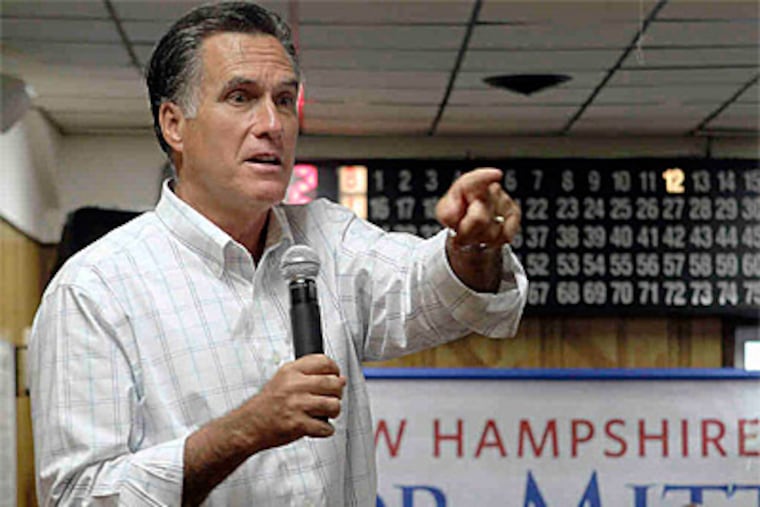The Pulse: Philadelphia's suburbs are critical to Republicans
If the Republican Party wanted a more efficient nominating process, it would move the early voting from Iowa, New Hampshire, and South Carolina to Abington, Newtown, and Fairless Hills.

If the Republican Party wanted a more efficient nominating process, it would move the early voting from Iowa, New Hampshire, and South Carolina to Abington, Newtown, and Fairless Hills.
When it comes to presidential selection, that old expression about all politics being local is true, at least for us in the Philadelphia area. The last Republican presidential candidate to carry Pennsylvania was George H.W. Bush in 1988. Since then, the pivotal Philadelphia suburbs of Bucks, Chester, Montgomery, and Delaware Counties have become less Republican and more moderate in their voting. And GOP presidential candidates have failed to win those counties and fallen short statewide.
The last three elections illustrate the predictive value of the Pennsylvania suburbs. In 2000, Al Gore won Bucks, Montco, and Delco (losing only Chester) and defeated George W. Bush in Pennsylvania, 50.6 percent to 46.4 percent. In 2004, John Kerry captured the same three counties and received 51 percent of the statewide vote to Bush's 48.5 percent. And in 2008, Barack Obama won all four suburban counties and carried the state, 54.7 percent to 44.3 percent.
The year 2008 provided some other evidence of the power of the suburbs. Despite Obama's 10-point margin and the Democrats' near-sweep of statewide offices, Republican Tom Corbett was reelected attorney general. Why? He carried Bucks and Chester while losing by less than a point in both Montco and Delco.
So who among the current Republican presidential aspirants would do best here in 2012?
Not Minnesota U.S. Rep. Michele Bachmann. She may have fired up the folks in Ames, Iowa, but it's hard to see her doing so in Ambler. Her opposition to gay rights - she said in 2004 that homosexuality is a "very sad life" - appeals to evangelical Christians and might play in Lancaster County, but it wouldn't here. "The only Bachman that appeals to the Philly suburbs are the pretzels," longtime Democratic strategist Larry Ceisler said.
Texas Gov. Rick Perry? His chief advantage in the primaries is that he has much in common with George W. Bush. That's also his chief impediment with swing voters. Those sound bites that bring down the house with GOP loyalists - such as responding to a question about whether Obama loves America by insisting, "You need to ask him" - would be ruinous in a general election here. Unless the economy gets even worse, it's hard to see Perry doing what McCain and Bush could not.
"Perry should be starting slow, but he is overreaching with swagger testosterone," the veteran local journalist Larry Kane told me. "He would only be strong here if he were perceived as a reasonable moderate."
This may surprise out-of-staters: The candidate with the best shot at carrying the Philly 'burbs isn't the Pennsylvanian. Rick Santorum lost the 2006 Senate race to Bob Casey, 58.7 percent to 41.3 percent. In the four counties ringing Philadelphia, the closest Santorum came to a victory was in Chester, where his deficit was 10 points. In Montco, Casey rolled up 61.9 percent of the vote. There is no reason to believe Santorum has reversed that standing.
Former Utah Gov. Jon Huntsman has shown political instincts that could appeal to the many independent-minded voters around the City of Brotherly Love. He was the lone GOP candidate to voice support for the debt-ceiling deal, he supported civil unions in Utah, and he was brazen enough to say he respects Obama.
Thus far, however, Huntsman has yet to emerge from the pack. If he doesn't, Mitt Romney seems to be the most palatable choice.
"Romney's more moderate stances, and the more muted way he uses the social issues, makes him more appealing there," said Terry Madonna, who heads Franklin and Marshall College's Center for Politics and Public Affairs. "Also, his private-sector background could be helpful with all of the business and entrepreneurial activities that go on in the 'burbs."
Charlie Gerow, a Harrisburg-based GOP strategist not currently affiliated with any of the candidates, concurred: "Mitt Romney, who is viewed as a moderate economic conservative, would probably be the strongest GOP candidate in the Philly suburbs," he told me. (Gerow nevertheless believes Rick Perry is electable statewide.)
In fact, every Pennsylvania political observer I spoke with deemed Romney the early front-runner in the Philly 'burbs, and I agree - that is, as long as it's Romney the moderate former Massachusetts governor making the obligatory visits to the Italian Market, and not the more conservative '08 also-ran who struggled to curry favor with the GOP base.